The pandemic has pushed us into embracing a new way of living where we remain confined and isolated. This unprecedented change has caused a severe impact on our mental and physical well-being which is why many have turned to the art of Yoga to curtail stress, enhance health, boost immunity, battle chronic diseases and build harmony between the mind, body, and soul.
Category: Uncategorized
YogiFi: Developing innovative systems and intelligent solutions that make holistic wellness accessible for everyone!
The Bangalore-based start-up, WELLNESYS is integrating ancient science with modern technology to deliver holistic wellness, assisting people to create and customize the best online and offline yoga. It puts forward a wide range of yoga learning sessions and meditation content that suits all ages, gender, and body. These sessions are curated by global experts who aspire to help people achieve the much-needed mental and physical discipline and peacefulness in times of this coronavirus pandemic.
WELLNESYS was one of the 12 start-ups which made it to the fifth edition of the Qualcomm Design in India Challenge-QDIC 2020, an initiative by Qualcomm that encourages design houses and product companies to invent useful and innovative hardware product designs incorporating Qualcomm chipset platforms and technologies. It ended the QDIC incubation as a second runner up. Qualcomm has been a very actively engaged partner of CoEIoT.

“Qualcomm Design-in-India Challenge has opened the doors for Make-in-India for our start-up. Qualcomm leadership team has been very supportive of our start-up journey, making meaningful connections, at the right time. The patent incentive has been really helpful as we could file more patents in the process,” states MuralidharSomisetty, CEO & Founder, YogiFi.
The fountainhead of Wellnesys, MuralidharSomisetty found solace in yoga for treating his spine injury without undergoing any surgery. The miraculous advantage of this holistic science encouraged him to pursue the art and propagate it. He soon came across the underlying challenges in the adoption and effectiveness of online yoga sessions. To mitigate this problem, he masterminded an award-winning product, YogiFi to revolutionize holistic wellness in the healthcare and fitness technology landscape, making yoga an integral part of our everyday routine.
“YogiFi is here to motivate, guide, and help every individual adopt the culture and exercise the healing power of yoga; guiding them towards a healthy and happy lifestyle. During the pandemic, the YogiFi app delivered at-home interactive yoga sessions using computer vision (camera of a smartphone) besides the smart mat solution with patented asana tracking technology. Each session is curated based on the insightful data and various metrics gathered from the mat: strength, alignment, flexibility, and endurance. Users can now understand the effectiveness of the yoga session with vitals data correlated from wearables such as Apple Watch,” he adds.

The start-up has leveraged technologies like Sensors, IoT, edge computing, AI, Computer Vision, and Apps to create an absolute wellness solution that synthesizes a nonpareil online and offline yoga studio experience at home. Its smart and eco-friendly yoga mats are sensor-equipped and are designed to be paired with the mobile app for enabling an interactive and immersive yoga class experience. These yoga mats can be connected with YogiFi App that acts like personal trainers, extending advanced interactive sessions, tracking the user’s activity & progress, and give real-time feedback on postures and flexibility. YogiFi delivers interactive and immersive yoga classes straight to an individual’s home using the fusion of smart mat and computer vision. YogiFi’s Virtual Studio feature in the app transports users (virtually) to exotic landscapes such as the Himalayas, Forest, Beach, and more by using AR/VR technology. This innovative solution is called “Yoga By Nature” and creates a real-life learning experience amidst a virtual yet aesthetic ambiance. YogiFi is also looking at launching a feature soon to enable user to practice along with a personal trainer or even participate in a fun challenge with any of their friends or peers on the YogiFi’s community leader board. It is compatible with wearables such as Apple Watch, FitBit for biofeedback and well-integrated with smart ecosystem products such as Google Home, Smart TV and others.
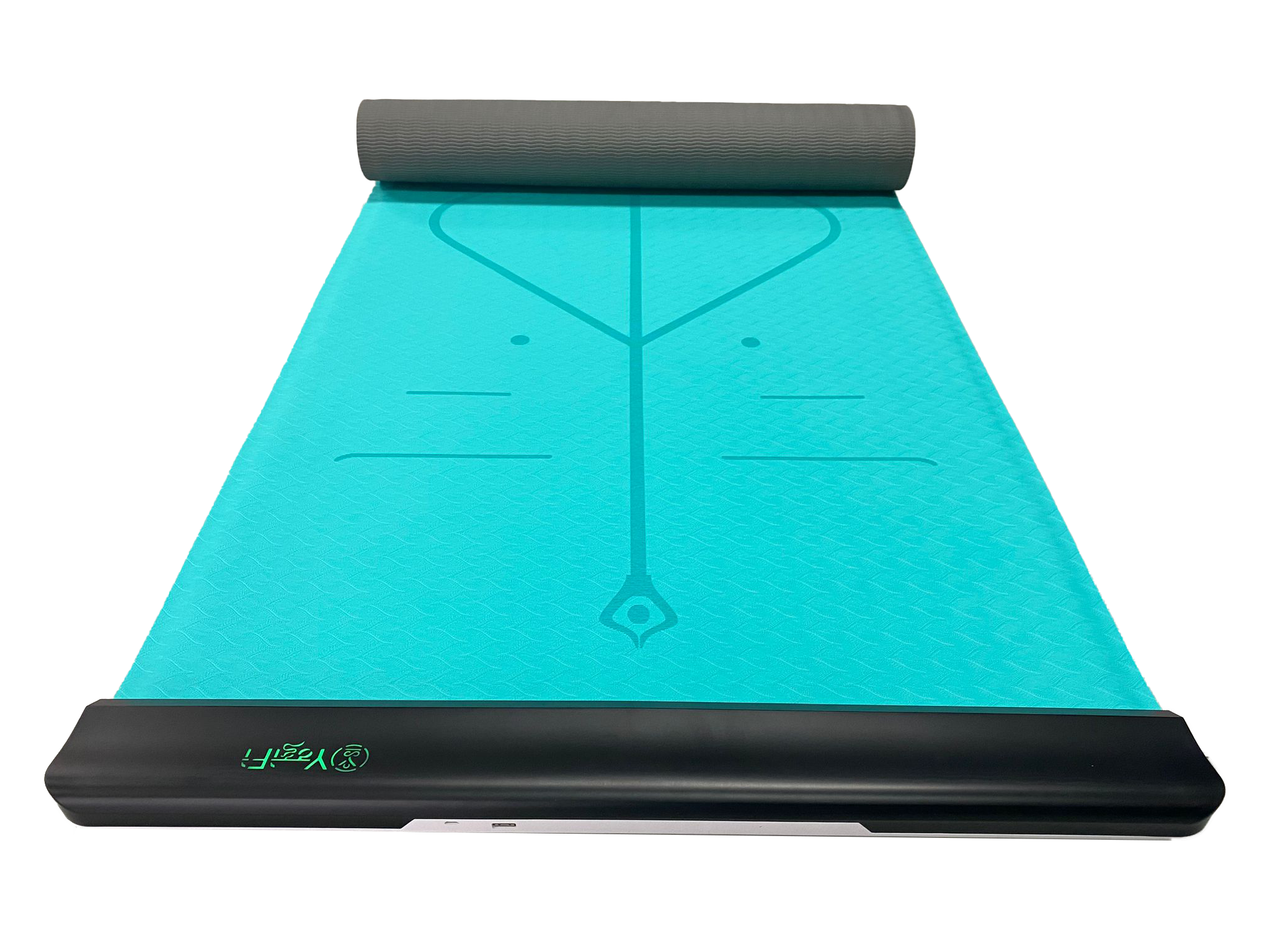
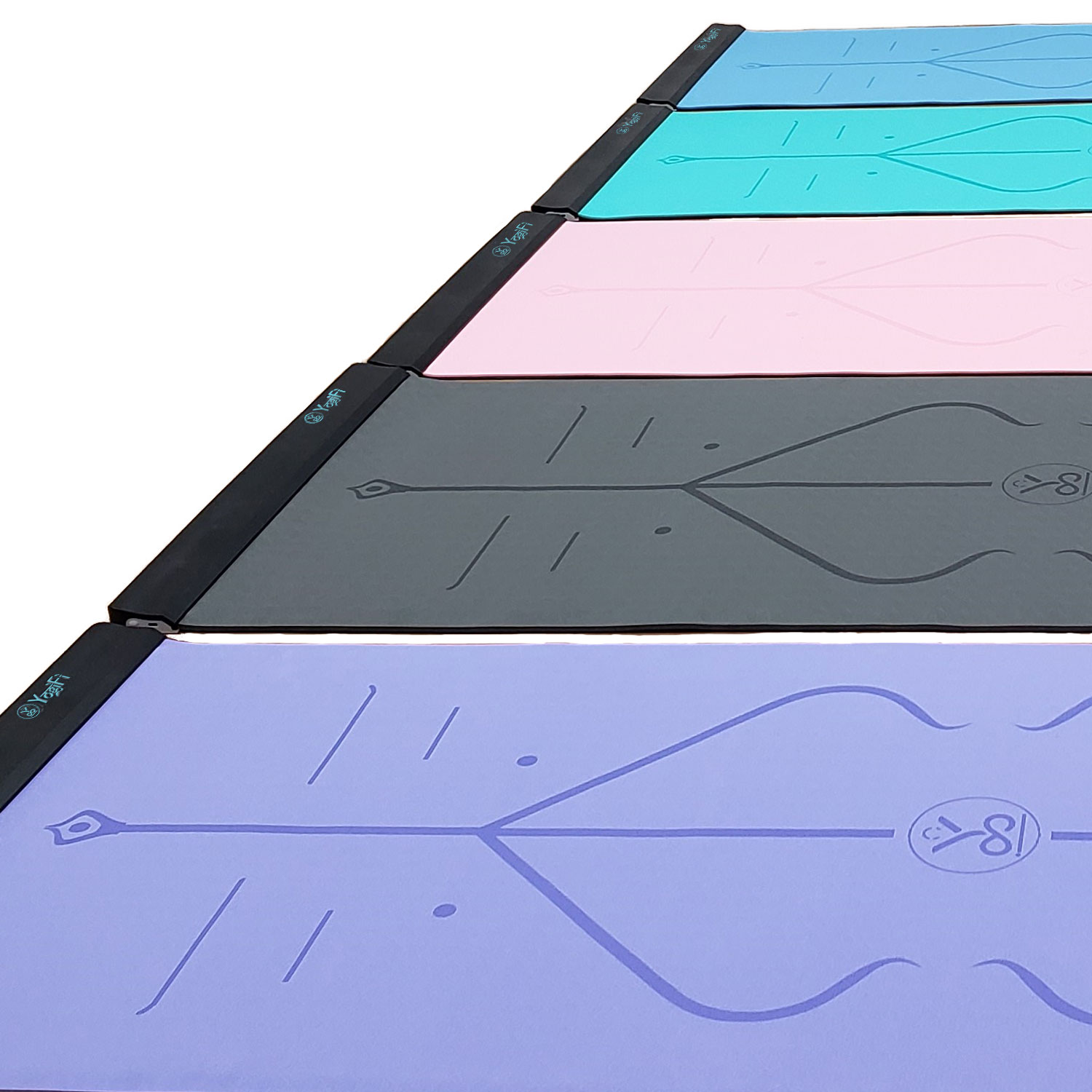
Within two years of its establishment, YogiFi has set a strong foot in the international market and has been successful in its endeavour of becoming a smart wellness companion, delivering technology-enabled solutions that are accessible by everyone, anywhere, and at any time. This initiative has won the company an array of innovation awards and global recognition with multiple media mentions.

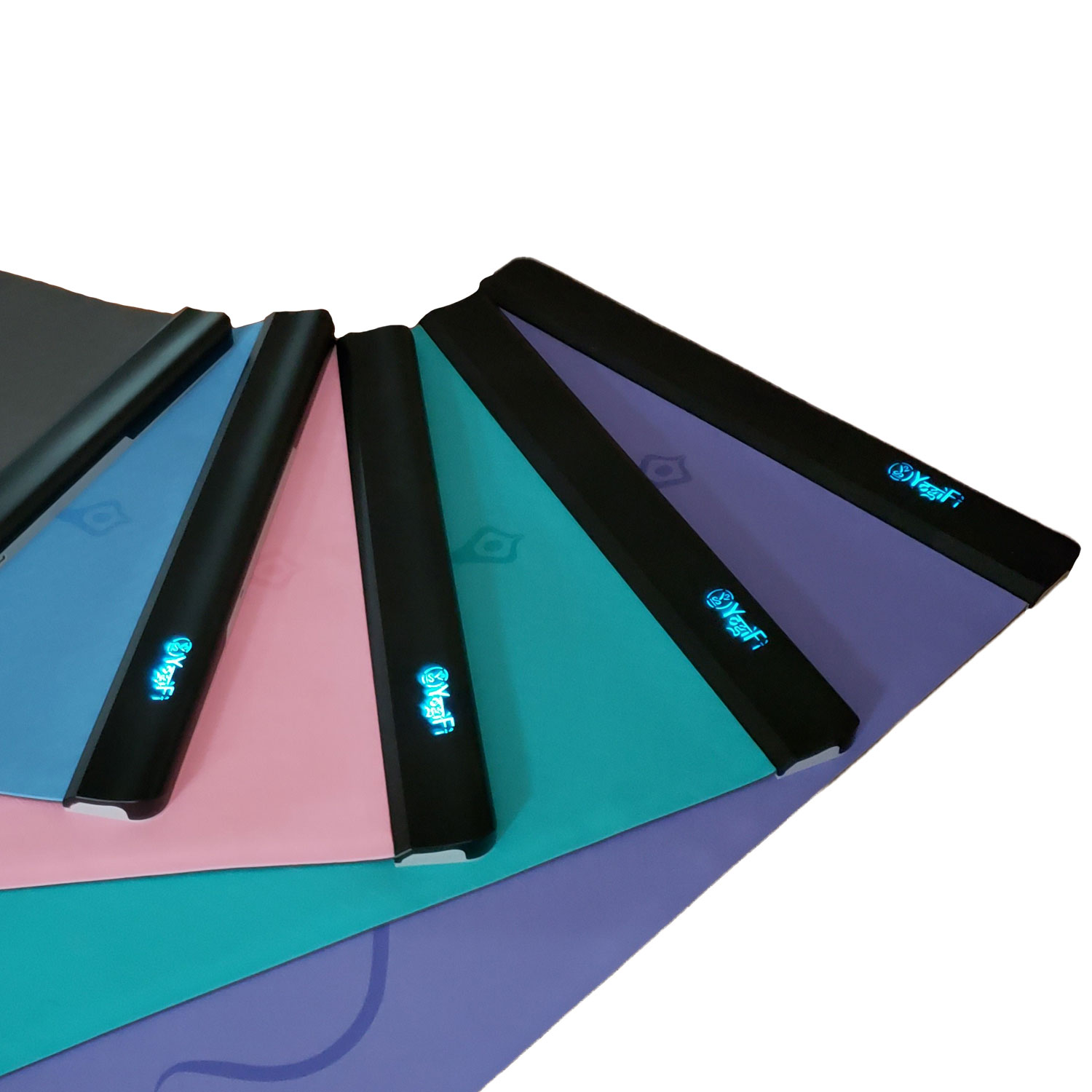
Under the aegis of the Make-in-India initiative and local assembly line, YogiFi envisages developing a lighter version of the product that is affordable and fits into the price-sensitive markets such as India, Asia-Pacific region. It aims to make yoga classes accessible across socio-geo-demographic boundaries and gamify the learning process through modern technologies.
For any further information\query you can write to us at Co-innovate@nasscom.in
CARER: An Integrative and Holistic platform that ensures Personalized Cancer Care!
The word cancer has been tormenting families for many centuries now. The diagnosis of this disease causes a lot of physical and psychological distress to patients and their families. Founder & CEO of CARER, Samara Mahindra’s subjective encounter with cancer has been an eye-opener where she realized that there were only methodical approaches availed for treating cancer and no emphasis is given to the quality of life or measures that can effectively support pre-cancer and post-cancer treatment. Intending to provide the sick and their family the support they need in their cancer journey, Samara along with a masterly team of Oncologists, Patients, and Science structured the foundation of Personalized Cancer Care providing platform- CARER that aims to be a ray of hope for people battling cancer and helping them heal, feel and live better.
Headquartered in Bangalore, CARER is on its mission of establishing a unique AI-driven integrative oncology health tech solution that will focus on 360-degree interactivity and connection between every health service provider, partner & patient, in-depth health tracking, therapeutic intervention, community building, data and content management. It offers an extensive range of programs that can be categorized into three parts-Integrative therapy for treatment, Integrative therapy for post-treatment, and Nutrition for Cancer.
The efficient team of Carer put their brains together to think up exclusive methodologies and therapies that consist of Nutrition Therapy, Movement & Meditation Therapy, and Mental Well-Being Therapy. One can also find recipe books, Cancer Essentials Guidebook, and other quality products that suit the needs of the patients at the CARER store. Since day one, CARER has been diligently working towards building credibility and evidence through clinical trials and patient pilot studies. They have curated a unique methodology that has proven to enhance cancer patients’ condition in multiple factors and parameters, curtailing their side-effects, improving immunity, and ensuring better treatment outcomes.
Additionally, CARER is advancing services to support patients recovering and healing from COVID as well as cancer. “At CARER, we made sure to provide services that supported efficient delivery of services and immediate response to our patients through technology. We have created certain specific therapeutic interventions for COVID-positive cancer patients and have partnered with other homecare service providers to make sure that our patients are getting access to high quality COVID care at home,” Samara Mahindra, Founder & CEO of CARER.
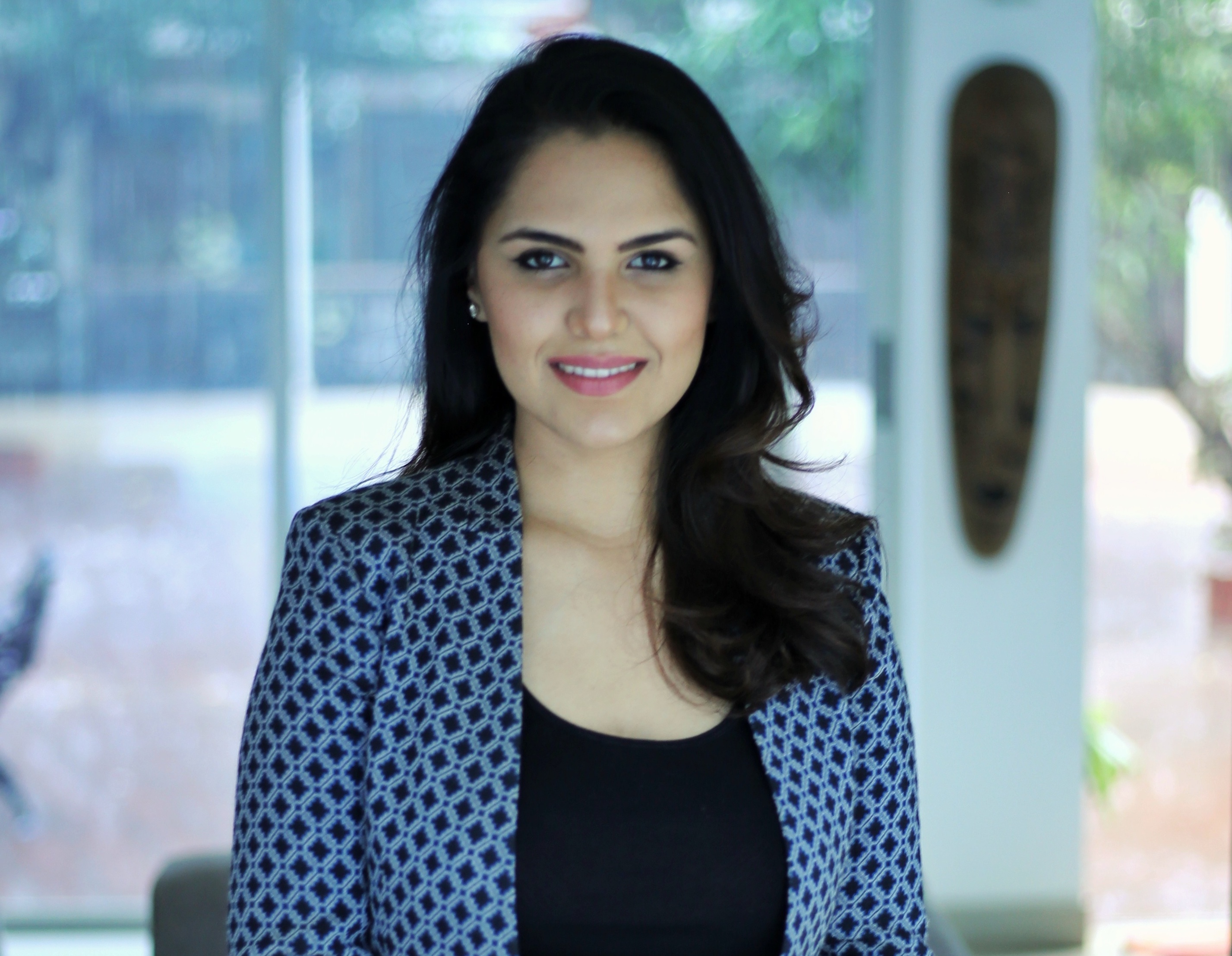
CARER started its journey in the year 2018 and in two years it has carved a niche for itself in the industry. The startup has to date treated over 400 cancer patients with 43 different cancer types. It has partnered with doctors, home care providers, diagnostic chains, genetic testing labs, pharmaceutical companies, and more than 10 leading hospital chains across the country suchas Fortis, Manipal, Aster CMI, NH, and others. This technology-driven platform has established a firm global presence and worked with patients in different parts of the world, from UK, US, Africa, South East Asia to the Middle East. Among the many projects, CARER had executed a prominent clinical pilot with HCG Hospital for patients suffering from head and neck cancer. The results of this study are being admitted for publication. Furthermore, CARER has secured seed funding in its very founding year.
“Our partnership with a reputable technology company and their connectivity with the international healthcare market has proven to be beneficial for us. This association helped us to have a better grasp of the healthcare ecosystem and following suit with the scientific methodologies that are enabled by technologies and are being developed all around the world. They have guided CARER to create a transformational integrative oncology solution, for the first time here in India. We are the first and only company that provides integrative oncology solutions to cancer patients,” she adds.
CARER has visualized its strategy towards building the largest integrative oncology technology platform that is AI and data-driven and completely focused on retrieving deeper clinical and non-clinical data points. The company will also be dedicating a section of its man oeuvres to recognizing larger clinical trials and R&D, along with brand building and patient acquisition.
“NASSCOM has been a great support system in encouraging and assisting companies such as ours that are trying to make a massive impact and solution-driven to change the way healthcare is administered. We are often connected to other large healthcare entities for various projects, through NASSCOM, which might not have been possible or as easy otherwise. The team has been extremely supportive and has taken a personal interest in helping us build valuable propositions for various projects.” Samara Mahindra, Founder & CEO of CARER.
For any further information\query you can write to us at Co-innovate@nasscom.in
AarogyaAI: Leverages contemporary technology and sciences to combat fatal infectious diseases!
Systematic integration of technology has utterly revamped the way medical care is conferred to patients, enhancing patient-physician interaction, and making healthcare more accessible & flexible than before. At the current set of circumstances where the entire world is grappling with a healthcare crisis, technology like Artificial Intelligence has helped in reducing the time spent in executing healthcare management activities at the fraction of the price.
Healthtech startup AarogyaAI is using AI-enabled software for expediting diagnosis and enabling personalized treatment within a few hours. Founded by two promising innovative women entrepreneurs Dr. Praapti Jayaswal and Avlokita Tiwari, AarogyaAI will combat lethal infectious diseases like Tuberculosis and develop an AI-driven software to diagnose Drug-resistant Tuberculosis, expediting the process of diagnosis and effective treatment.
AarogyaAI is one of the six startups that have graduated from the India Edison™ Accelerator, Cohort 2- GE Healthcare’s second startup-collaboration program that intends to nurture the startup ecosystem and work with them to create innovative and effective healthcare solutions.
The AarogyaAI software innovated by the company is deployed in the GE Edison platform. It is empowered with a Machine Learning algorithm that has the ability to make sense of complex genomic data and output an easy to comprehend drug sensitivity report which augments clinical decision-making. Thus, each patient’s antibiotic prescriptions are customized to their specific need.
“Artificial intelligence helps convert large amounts of complex data to concise factoids that can augment a doctor’s clinical decision making. The AarogyaAI’s SaaS requires minimal infrastructure and basic training to operate and can report a copper-bottomed patient’s drug susceptibility status in a few hours,” states Dr. Praapti Jayaswal, Co-Founder & CEO, AarogyaAI.

Since inception, AarogyaAI has created a buzz in the ecosystem. The firm has secured investment from one of the largest genomics companies in the world, Illumina Inc., USA. In 2019, the team at AarogyaAI was awarded the Best Pitch by Shakti – The Empathy Project. It made its way to be a part of the San Francisco-based Illumina Accelerator Program in 2020. In March 2020, AarogyaAI also won the BIRAC TiE WInER Award which is accredited to Women in Entrepreneurial Research by the Biotechnology Industry Research Assistance Council (BIRAC).
In addition, winning awards like the Indo-Sweden Healthcare Innovation Challenge, organized by the Ministry of Health and Family Welfare, Government of India, and getting on board in the GE Healthcare’s Indian EdisonTM Accelerator platform has gained it national as well as international level recognition.
“We established AarogyaAI in 2019, with the sole purpose of revolutionizing the method of treating Tuberculosis and saving lives. We have partnered with leading diagnostic labs & hospitals in India for building & validating the product. Eventually, we aim to anticipate the evolution, nature, and pattern of the bacteria, along with predicting the future drug resistance structure. We leverage AI/ML and genomics, to rapidly and comprehensively diagnose drug resistance in infectious diseases. We also intend to use AI, ML, and IoT technologies to ensure that patients even in the most remote corner of India, have access to the latest diagnostics and treatment options,” states Avlokita Tiwari, Co-Founder, AarogyaAI.
With a vision to contribute to ending tuberculosis globally, the founders are driven by the concept of translation of research into real-world application. AarogyaAI envisions assimilating years of research to combat antimicrobial resistance in infectious diseases. The company wants to employ cutting-edge technology – genomics and AI to ensure patients are provided precision diagnosis to enable effective medication. The intention is to collaborate with centers from different geographical locations in India, and abroad; and expand the database on more first and second-line anti-TB drugs. The AarogyaAI solution will be able to predict new mutations that confer drug resistance in the bacteria. AarogyaAI aims to impact human health and build facilities where no one is subjected to incorrect medication and is left to deal with very harmful side effects.
“AarogyaAI is on a vision to develop a time and cost-effective test for the drug-resistant tuberculosis. Their technology will go a long way in addressing the appropriate management of the disease burden and potentially contributing to the ending of the TB epidemic by 2030, which is one of the heath targets of the United Nations Sustainable Development Goals.” Abhijit Patil, Senior Director – AI & Analytics: Advanced Technology Group @ GE Healthcare and India EdisonTM Accelerator Cohort 2 Mentor.
Tackling The Cancer Epidemic Using AI
In recent times, breast cancer has become the most common type of cancer affecting women worldwide accounting for 25% of all cancer cases and affected 3.5 million people in 2017-18. Early diagnosis in these cases significantly increases the chances of survival. The key challenge in cancer detection is how to classify tumours into malignant or benign. Research indicates that most experienced physicians can diagnose cancer with 79% accuracy while using artificial intelligence based diagnosis, it is possible to achieve 91% accuracy.
NASSCOM CoE-IoT & AI & Eqounix Tech Lab organised a hands-on session on 28th September 2019, 10am onwards at the CoE Gurugram center on Breast Cancer detection. This was a paid session and there were over 50 attendees, consisting of basic & advanced developers from enterprises like Sopra Steria, United Health Group, TCS, HCL, Inventum Technologies, Publicis Sapient, Globallogic etc and startups like Attentive AI, Empass, Anasakta Labs, NEbulARC, SirionLabs & Vision Networkz. Students from ICGEB/JMI, Indira Gandhi Delhi Technical University etc also participated in the session.
The session first half focussed on Wisconsin Diagnostic Cancer (WDBC) & Invasive Ductal Carcinoma (IDC) datasets insights, Visualization of Dataset, feature selection and why they are chosen and how the physical parameters are translated into a dataset. In the second part, the focus was on Feature Selection and CNN, random forest based classification of cancer as malignant or benign followed by the optimised the deployment strategy & cost estimation
WISCONSIN DIAGNOSTIC BREAST CANCER (WDBC):
The samples consist of visually assessed nuclear features of Fine Needle Aspirates (FNAs) taken from patients. Attributes 3 to 11 were used to form a 9-dimensional vector which was used to obtain a neural network to discriminate between benign and malignant samples. Cross-validation was used to project the accuracy of the diagnostic algorithm.
| Field | Attribute |
| 1 | Sample code number |
| 2 | Class: 2 for benign, 4 for malignant |
| 3 | Clump Thickness |
| 4 | Uniformity of Cell Size |
| 5 | Uniformity of Cell Shape |
| 6 | Marginal Adhesion |
| 7 | Single Epithelial Cell Size |
| 8 | Bare Nuclei |
| 9 | Bland Chromatin |
| 10 | Normal Nucleoli |
| 11 | Mitoses |
INVASIVE DUCTAL CARCINOMA (IDC)
Invasive Ductal Carcinoma dataset originally consisted of 162 slide images, scanned at 40x. From that, 277,524 patches of 50×50 pixels (which is converted to 32 x 32pixels to fit the model architecture) were extracted, including, 198,738 IDC negative examples & 78,786 IDC positive examples. Each image in the dataset is labelled based on the following parameters:
- Patient ID: 10253_idx5
- x-coordinate of the crop: 1,351
- y-coordinate of the crop: 1,101
- Class label: 0 (0 indicates no IDC while 1 indicates IDC)
CNN Architecture used:
- Used exclusively 3×3 CONV filters, similar to VGGNet
- Stacked multiple 3×3 CONV filters on top of each other prior to performing max-pooling (again,
similar to VGGNet)
- But unlike VGGNet, used depthwise separable convolution rather than standard convolution layers
- Keras Sequential API is used to build CancerNet
The model achieved 86% classification accuracy, 85% sensitivity, and 85% specificity.
CODE REPOSITORY:
https://bitbucket.org/tdequonix/cancer_detect_meetup_resources/src/master/
Enter git clone and the repository URL at your command line:
git clone https://shantanugaur@bitbucket.org/tdequonix/cancer_detect_meetup_resources.git
- build_dataset.py : Builds the dataset by splitting images into training, validation and testing sets.
- cancernet.py : Contains CancerNet breast cancer classification CNN
- train_model.py : Responsible for training and evaluation of Keras classification model
DATASET & PRESENTATION:
https://drive.google.com/open?id=1kgbtXSkDhDXK1aTCb8l1GvQcOn3iTjZQ
NEXT SESSION:
The next session will be focussed on the Prognostic system. This recently put into clinical practice, is a method that predicts when the cancer is likely to recur in patients that have had their cancers excised. This gives the physician and the patient better information with which to plan treatment and may eliminate the need for a prognostic surgical procedure. The novel feature of the predictive approach is the ability to handle cases for which cancer has not recurred as well as cases for which cancer has recurred at a specific time.


CDAC Workshop on Healthcare Data Standards, Data Privacy and Data Security

Electronic/Personal Health Records (EHR/PHR) and Hospital Information Management Systems (HIMS) are at the core of healthcare data aggregation, as innovators strive to integrate their technology solutions with the country’s existing EHR/PHR and HIMS databases.
C-DAC, an entity of MeitY, is at the helm of innovation in technology for several industries including healthcare. For the last 20+ years C-DAC has been working on Health Information Solutions covering multiple business needs prioritised by the Government.
NASSCOM CoE-IoT organized a workshop where the leadership teams from C-DAC provided an overview of the entire health-stack developed and implemented by them. Nearly 30 Startups participated in the workshop to learn about the relevance of EHR2016 standards, provisions in the draft DISHA guidelines on Data Privacy & Security and the modalities for integrating their digital solutions with C-DAC applications through API integration.

An interactive Panel Discussion was moderated by Raghuram Janapareddy, Director (Lifesciences & Healthcare), NASSCOM CoE with the panellist Mr.Vivek Khaneja Executive Director, Mr.Pavin Srivastava, Associate Director and Mr.Rajiv Yadav Associate Director. The startups clarified their doubts on Data Security/Privacy, EHR Standards and the opportunities to work with C-DAC. Later Startups made presentations about their solutions for the benefit of the C-DAC Team.



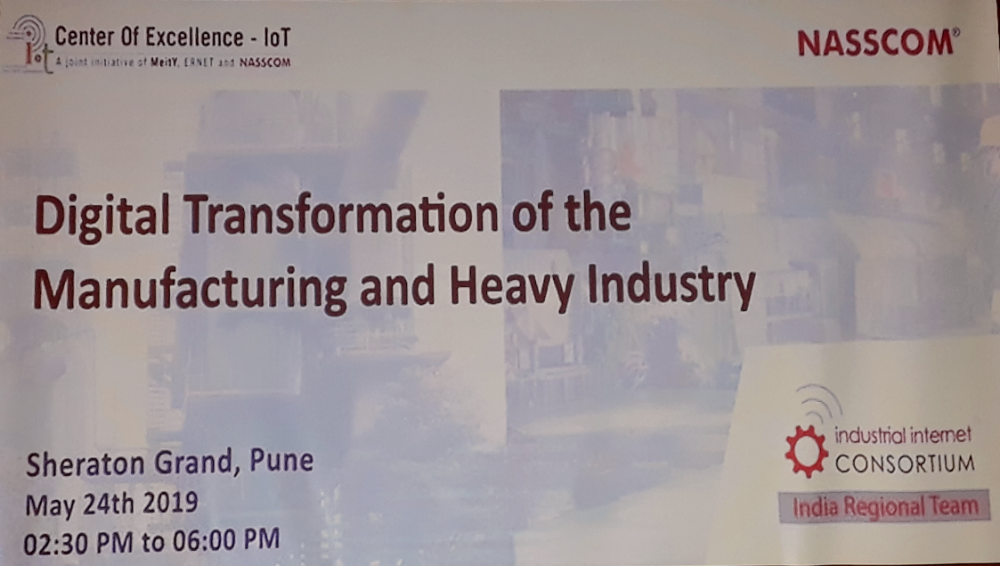
NASSCOM CoE-IoT and IIC join hands for promotion of Digital Transformation of Manufacturing Industry
Pune: The combination of advanced manufacturing process and diverse digital technologies continues to proliferate digital transformation of manufacturing enterprises in India, but at the same time it experiences setback and resistance to the adoption. The wireless communications, internet, innovative solutions, and predictive maintenance allows manufacturing industries to benefit from lower adoption costs and increased productivity and efficiency.
The ‘Digital Transformation of the Manufacturing and Heavy Industry’ conference jointly organized by NASSCOM & IIC was held on May 24, 2019 at Sheraton Grand Hotel, in Pune. The objective of the conference was to highlight the impact by creating an ecosystem of technology players, manufacturing enterprises and innovative start-ups.
Dr. Ganesh Natrajan, 5FWorld, Chairman, shared his insight about intelligent factory operations, demand forecasting, intelligent data security solutions and predictive maintenance. He discussed several case studies from Siemens on intelligent gas turbines, GE Aviation – digital twins for predictive maintenance and Jabil predictive factories. Various key factors which could influence the adoption of and define the roadmap of Industry 4.0 in the Indian manufacturing industry were discussed.
Dr. Manoj Athawe, Cummins Group, delivered the keynote session where he discussed the IoT telematics ecosystem and its future in the automotive industry. Dr. Athawe also shared his views on the smart grid battery charging stations and how it could be leveraged to promote renewable energy resources.
Dr. Kiran Bala, SKF, said that the changing employment landscape and key challenges of leadership, workforce skill gap and infrastructure imperative are being faced by every industry. She also stressed on various skills imperative – both digital and cross-functional in nature to be adopted by manufacturing firms in taking a step forward.
During the session three solution providers shared their experience with different solutions that they have deployed and how it benefited the users.
The Altizon team spoke about how they investigate defective manufacturing practices and flawed quality control in their customer operations. The team works on the cause and effect analysis using several 5S quality tools such as Ishikawa diagram to deal with process genealogy & map the complete value chain analysis.
In one of the case studies shared, Intellinet have reduced production time for many customers with the implementation of digital solutions by capturing date from different combination of sensors, PLC and serial interface. Many issues which Intellinet faced during implementation, increased involvement of foot soldiers, addressing maintenance related queries and adopting continual improvement processes to it by appointing local champions on the shop floor and operations and maintenance representative per machine type.
Entrib team identified the challenges faced by one of the automotive two-wheeler OEM. The OEM faced challenges like missing insights on quality improvement, uncontrollable utility costs and limited process monitoring and visibility. The team worked on complete digitalization of the paint shop and various operations with generation of a digital dashboard. The solution generated meaningful insight along with analysis of each process with basic predictive alerts.

The conference also featured a high powered panel discussion, consisting of speakers from both solution providers as well as solution users. Speakers included Mr. Pranab Prasad from Tata Motors, Mr. Anupam Shrivastav from Sudarshan Chemicals, Mr. Shirish Sabnis from John Deere, Mr. Rajeev Dev from Cybage, Mr. Anurag Ambedkar from Maven and Dr. Arvind Tilak from AIPL. The discussion was moderated by Mr. Sudhanshu Mittal from NASSCOM CoE-IoT.
Key items from the panel discussions were around the fact that most of the solution providers working in the area of Analytics / AI / Prediction don’t have domain knowledge when they pitch their solutions to the users and these turn into a long duration co-create projects for users. Also, the challenges in scaling from PoC to actual deployment and even identifying the right solution partners were discussed. Most of the time users don’t have the requisite technical expertise and hence face problem in being able to evaluate the solution providers pitching their solutions. The perspective that solution providers give, was that top management of users are more focused on buzzwords like AI / ML etc., without realizing that each operation is unique and hence not feasible for any solution provider to start doing predictive analysis and suggestions from the first day itself.
In addition, many a times the manufacturing companies have just basic SAP solutions being used for finance / HR work, without any clarity about the ability to handle the incoming data from the shop floor. Most of the times there is no single point of contact to discuss with, when addressing technical challenges. In general, the solution providers do not find it necessary to include the security aspects as the user usually is uninterested and is just looking for quick and inexpensive deployment. There was rigorous exchange with the audience who were interested in further exploration of thoughts from panelists regarding the addressing of the challenges and bridging the gap between the solution providers and the end users.
Pain-free, accurate breast cancer detection? AI, Sir.
India is a goldmine for innovation in healthcare. A billion-strong population, scattered across 29 states, each with its own unique living conditions is bound to create a cornucopia of healthcare challenges. As the country has progressed, so has the landscape of disease. India is a hotbed for non-communicable diseases (NCDs) such as diabetes, cancer and heart ailments. Unlike invasive surgical procedures, treatment of NCDs are time-consuming and expensive.
One of the most common ailments seen today is breast cancer. One in every 28 women are likely to develop breast cancer during their lifetime. India, unfortunately, has among the top incidence rates for this disease and had the highest mortality rate for breast cancer globally in 2017. Ask any oncologist and they will tell you that early detection can go a really long way in mitigating fatality. Moreover, the cost of later detection is almost twice as high compared to early detection.
However, early stage scanning in India conventionally involves mammograms, which exposes a woman to needless amounts of radiation and X-Rays. Additionally, mammograms are generally done on women over the age of 45 and show anomalies in the breast tissue as prominent white spots on an X-Ray.
What about women below the age of 45? And what about benign tumours?
This was a critical inflection point for Geetha Manjunath and Nidhi Mathur, founders of NIRAMAI, one of India’s first AI-powered, non-invasive breast cancer screening devices. NIRAMAI is an acronym for Non Invasive Risk Assessment with Machine Learning & Artificial Intelligence – and uses only a thermal imaging device to measure temperature distribution on the chest. Data is then analysed by a cloud-based analytics platform that assesses if the breast has malignant tumours.
Unlike other screening devices, NIRAMAI is powered by Artificial Intelligence and is a definitive example of digital propulsion to address healthcare challenges in India
Technology at the core of Niramai
At the very heart of NIRAMAI’s solution is an AI-enabled, computer-aided diagnostic engine called Thermalytix, which uses a high resolution thermal sensing device and a cloud-hosted analytics solution to survey images. A combination of big data analytics, AI and ML are used to detect breast cancer at an early stage.
NIRAMAI’s cancer screening tool SMILE has been tested on more than 4,000 women in 12 hospitals, diagnostic centres and screening camps
The results from NIRAMAI’s proprietary platforms indicate:
- 90% sensitivity in all trials
- 27% higher accuracy than mammograms
- 70% higher positive predictive value than visual interpretation of thermography
- Accurate detection of cancer lesions as small as 4 mm
With the use of technology, NIRAMAI has revolutionized breast cancer detection in India by making it accurate, accessible, non-invasive and completely technology-enabled.
At the core of India’s diverse healthcare spectrum lies a common challenge – uniting the level of care, diagnosis and treatment that can drastically improve the quality of life. Technology is the answer to this challenge, and companies like NIRAMAI are proving this adage to be true.
At the upcoming Lifesciences & Healthcare Innovation Forum (LHIF), scheduled to be held in New Delhi on April 30, 2019, experts from India’s medical and healthcare community, startups, innovators, government and academia will convene to discuss the Digital Propulsion of Universal Healthcare.
To register, visit http://www.coe-iot.com/lhif5/
ICANN Principal Technologist Alain Durand discusses scope of research on Draft Durand Object Exchange
Durand talks about challenges and benefits of IPv6 adoption at NASSCOM CoE
Alain Durand, principal technologist of Internet Corporation for Assigned Names & Numbers (ICANN) paid a visit to the NASSCOM Center of Excellence Gurugram, where there was a vibrant and informative exchange on the potential benefits of establishing standards to the current proprietary systems of firmware download for IOT devices, and the benefits of adopting IPv6 over IPv4.





